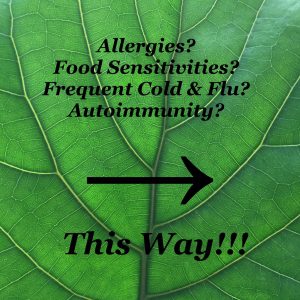By Dr. Kathleen Regan, ND
Immunity is about harmony between the person and their environment that involves a complex web of interactions including those with other people, culture, food, work, weather…. Everything! One might say that the immune system is about relationships or how the cells of the body relate to the outside world. A person dealing with an immune issue whether it is frequent illness or autoimmune conditions like rheumatoid arthritis or lupus MUST consider the relationship between their inner world and the outside environment.
The Mind-Body-Immune System Connection
An increasing body of research supports the idea that the mind and nervous system are capable of modulating immune response. The term ‘psychoneuroimmunology’ comes from the growing understanding that our thoughts, moods and emotions affect our neurological and endocrine systems that affect our immune function. The immune system communicates with our neurological and hormonal systems to activate or inhibit immune function. Physical illness and immune system issues can also affect our mental and emotional well being. This relationship goes both ways.
General Types of Immune Conditions
How you know if you have an immune issue? Well, sometimes it is simple – you may have frequent colds, flus or other illnesses that are difficult to control. Or perhaps you are plagued by seasonal allergies, allergies in general or food sensitivities. Other people suffer from autoimmunity where their own immune system attacks the cells of their own body.
Immune Deficiency Diseases: These pathologies are associated with a malfunction in the immune responses due to a hereditary or acquired immune deficiency (Ex., Chronic Viral Infections such as Epstein Barr or HIV).
Hypersensitivity Reactions: These occur when normal immune processes become compromised. Theseyou’re your typical allergies or sensitivities. There are 4 types of hypersensitivity.
Type 1: Anaphylactic reactions which IgE sensitized mast cells and basophils come into contact with antigens. Reactions include anaphylaxis, atopic skin disruptions, hay fever and allergic asthma.
Type 2: Cytotoxic reactions in which an antibody and antigen binding on a cell surface damage that cell. For example blood transfusion reactions and Rh incompatibility reactions
Type 3: Immune complex reactions in which circulating antigen-antibody complexes deposit in the vessel or tissue. This process occurs in most autoimmune conditions including psoriatic arthritis or rheumatoid arthritis and is also the main mechanism of food sensitivities. This is why removing food sensitivities is important in autoimmune diseases.
Type 4: In cell-mediated immunity, immune responses are mediated by T cells rather than by antibodies. For example contact sensitivities such as poison ivy.
Autoimmune Diseases: Autoimmune diseases occur when lymphocytes produce antibodies that attack the body’s own cells and tissues as if they were foreign substances. Autoimmune conditions such as psoriasis, psoriatic arthritis, rheumatoid arthritis, lupus, multiple sclerosis are not well understood. We do not understand exactly why the immune system turns against the body. However, it is speculated that environmental factors, allergens, undetected viral or bacterial infections, stress and genetics all play a role. Inflammatory factors are typically high in autoimmune patients. This is important because any factor that increases inflammation can possibly spark an episode of symptoms. This includes changes in environment, weather, allergens, foods that burden the organs of elimination, viral or bacterial infections, other burdens on the immune system and stress.
General Immune Support
Detoxification is an important first step with immune imbalance because it helps to restore normal homeostasis and reduce inflammation. Detoxification can be done through diet, lifestyle, addressing mental and emotional factors as well as applying plant medicine.
‘Detoxification’ is simply abstaining for substances, foods and lifestyle choices that place a heavy burden on the organs of elimination while using foods or herbs that promote bowel movements, movement of the lymph, encourage liver filtration of the blood and kidney filtration of the fluids. In doing so, we allow the body to excrete toxins and absorb important nutrients. Toxins are distractions for the body. When the body is over burdened with toxins, it cannot focus properly on defending itself from outside invasion nor does it have time to ensure the proper regulation of immune cells.
Imagine, if you will, a castle being defended by an army that is cut off from food, struggling with waste and it doesn’t have the resource to make weapons – this castle will surely be overrun quickly by invaders. It is the same with a body burdened by toxins, allergens or inflammation.
Special Immune Supporting Diets
Whether you are in an immune deficient state or in an autoimmune state, a hypoallergenic diet that eliminates common food sensitivities can help to determine if foods are playing a role. Sometimes Food Sensitivity Tests are a quicker way to rule out foods burdening your immune system. In addition, a Comprehensive Stool Analysis can let us know if you have the bacteria required to balance your immune function or if there are unfriendly bacteria or parasites that are affecting your immune function.
In states of immune deficiency, ‘Paleo’ type diets (low carb/sugar diets) can be helpful because they reduce the food necessary for microbes or immune invaders to survive. Including additional immune supportive foods such as fermented foods and bone broth soup helps to encourage the development of immune supportive bacteria and bolsters the number of functional immune cells. Such a diet can also help to heal the gut, our first line of defense against the outside world.
In states of autoimmunity, ongoing hypoallergenic diets as well as anti-inflammatory diets or the well-known Mediterranean Diet can help to take the burden off the immune system and reduce the systemic inflammation that often underlies autoimmunity.
Plant Medicine for the Immune System
Grabbing plant medicine from the shelf can be easy. There are many formulas in health food shops claiming to balance or boost immune function. However, it is important to know that herbal medicine is potent and should be prescribed by a qualified herbalist or naturopathic doctor.
Plants work in many different ways. In the world of immunity it is important to understand that some herbs stimulate immune function and some herbs modulate immune function. An individual with low immune function would be a candidate for immune stimulation while and individual with autoimmune function would be a candidate for immune modulation.
Immune Stimulators (Frequent, recurrent illness)
Astragalus Root
Codonopsis
Reishi Mushroom
Shiitake Mushroom
Schisandra Berry
Immune Activation (Acute Infections Ex., cold & flu, sore throat, cough)
Garlic
Wild Indigo
Calendula
Myrrh
Echinacea
Thuja
Usnea
Immune Modulation**
Echinacea (Controversial)
Bupleurum
Rehmannia
Wormwood
Feverfew
St. Johns Wort
Reishi
Shiitake
**Immune Modulation Involves using alterative herbs (Burdock, Cleavers, Nettle), and nervine herbs (Oatstraw, Skullcap, St. Johns Wort) to calm the nervous system.
The Immune System Checklist
Whether you are run down, allergic or struggle with autoimmunity this checklist can help you manage symptoms
- Take stock of your stress levels. If you cannot reduce stress levels it will be VERY challenging to manage the immune system
- Take a look at the relationships in your life. Have you established healthy boundaries? The immune system is a type of boundary and it can often reflect the boundaries we have in other areas of our lives. If we leak energy through poor relationship boundaries we have precious little energy left for managing immune boundaries.
- Examine your environment. We cannot live in a bubble but we can do our best to keep our living environment free of dust and mold. We can drink clean water, eat clean food and breath clean air. Environmental factors also include the products we use on our hair and skin as well as out cleaning detergents.
- On the dietary front, begin with holistic detoxification choices. Remove emotional, environmental and dietary sensitivities for a period of 3-12 weeks. See how you feel!
- Consider your exposure to food allergens. Try a hypoallergenic diet or run a food sensitivity test.
- Depending on your type of immune issue you may want to continue a hypoallergenic long term. Or perhaps Mediterranean diet or Paleo-type diet is a better fit for you.
- Talk with your Naturopathic Doctor about the best herbal medicines to give your system that extra boost!






